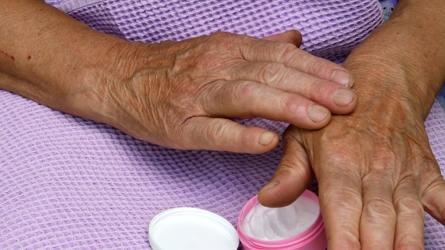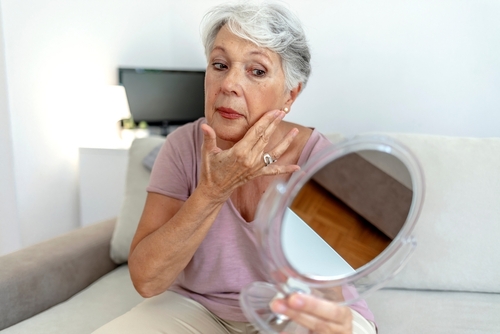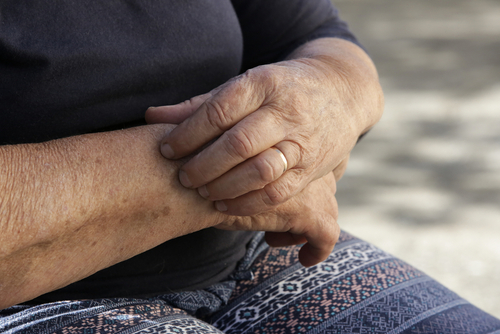Elderly Skin Care Tips: Common Conditions and Aging Problems
Category:

Skin changes naturally as we age. Elderly skin is less oily, less elastic, thinner, and bruises more easily than “normal” skin. As a result, seniors may notice changes or issues with their skin that they did not have when they were younger.
Skin Complaints in the Elderly
The most common elderly skin problem is the dreaded wrinkles. Wrinkles are one of the most visible signs of aging. They happen when the skin loses its flexibility and elasticity. You may have heard of “laugh lines” or “worry lines” since those are some of the first to appear on the face. Chronic sun exposure and smoking can both cause wrinkles to form earlier than they might naturally.
Another common elderly skin condition is dry skin. Dry skin occurs more often in the elderly because skin dries and produces less oil as we age. Dry skin doesn’t sound too bad, but can become problematic if it starts to itch. It is easy to absent-mindedly scratch dry skin until it breaks and bleeds. Elderly skin heals slowly, and cuts or scrapes can easily become infected. So keep an eye on dry skin and use your favorite moisturizer to stave off the itching.
A third and more serious elderly skin condition is skin cancer. Skin cancer is mainly caused by the sun, so avoiding sun exposure is crucial to keeping skin healthy. Sun exposure can also cause “age spots,” or dark brown spots on the face, hands, and arms. Age spots should frequently be checked for changes that could indicate skin cancer. The National Institute for Aging recommends checking once per month for skin cancer, and offers these tips to spot it early:
Check Moles, Birthmarks, and Other Parts of the Skin for the ABCDE’s:
-
A = Asymmetry. One side of the growth looks different or larger than the other.
-
B = Borders that are irregular
-
C = Color changes or more than one color
-
D = Diameter greater than the size of a pencil eraser
-
E = Evolving. This means the growth changes in size, shape, symptoms (itching, tenderness), surface (especially bleeding), or shades of color
If you notice any of these signs, you should see your doctor right away to determine whether or not you have skin cancer.
Download a Free Guide to Early Signs of Melanoma
Elderly Skin Care Tips
Some things you can do to keep elderly skin healthy are:
-
Use soap that contains a moisturizer or is formulated for dry skin
-
Use a moisturizing cream or lotion. There are hundreds of options, so you can find one that feels good for you, and even add it to your self care routine by choosing a relaxing scent.
-
Bathe every other day rather than every day to prevent drying out the skin.
-
Drink plenty of water and other fluids.
-
Limit caffeine which dries you out.
-
Use humidifiers to add moisture to the air.
-
Avoid sun exposure, especially during the heat of the day, between 10am and 4pm.
-
If you do go out in the sun, use sunscreen, wear a hat, and wear loose fitting clothing that covers as much exposed skin as possible.
While some skin changes in elderly can be expected, there is plenty that can be done to keep the skin healthy-looking and feeling good as long as possible.
Subscribe
Date: April 27, 2021
Category:


